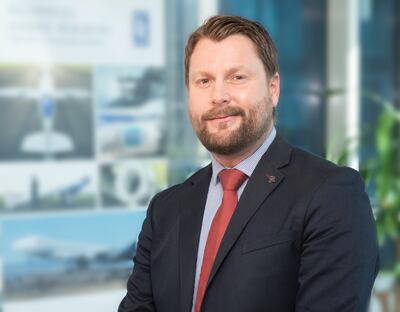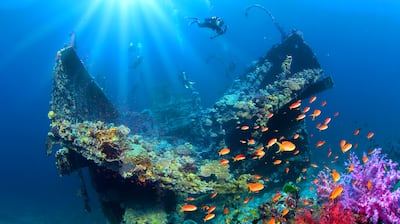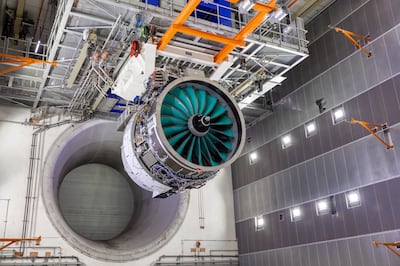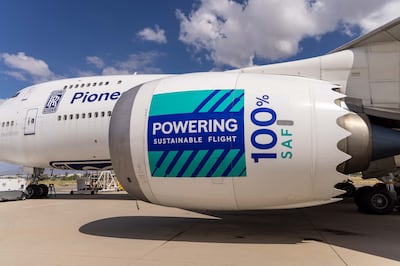With the launch of next-generation technology, the head of Rolls-Royce’s Middle East, Turkey and Africa (Meta) operations said the Middle East markets will be crucial in the company’s overall plan to quadruple profits by 2027.
John Kelly, President of Meta at Rolls-Royce, said The national “merging key market opportunities with phenomenal growth opportunities across all our divisions” will be key to achieving the profit growth objective.
Last year, Rolls-Royce CEO Tufan Erginbilgich outlined his plan to quadruple profits in five years by improving jet engine performance and cutting costs.
In commercial aerospace, defense and sustainable energy solutions, the Middle East ticks the boxes for businesses that will help Rolls-Royce achieve its goals, Mr Kelly said.

Rolls-Royce sees a huge opportunity for its aero engine business in the growing tourism markets of the GCC, particularly that of Saudi Arabia.
“You have new airlines, like Neom Airlines and Riyadh Air, so the whole region, the right vision, the right location and there’s capital to make that happen,” Mr Kelly said.

“Challenging Environment”
On jet engines for its airline customers in the region, Mr Kelly said Rolls-Royce recognized it was a “challenging environment” and that the company was “not backing down from it”.
Emirates Airline president Tim Clark criticized Rolls-Royce over its pricing and engine performance at the Dubai Air Show last November.
The issue was around performance and durability, which all aircraft engine manufacturers face in the sandy and hot conditions of the Gulf states.
“We’ve had open discussions with the likes of Sir Tim Clark about how to prepare for the challenging environment,” Mr Kelly said.
“We have invested in our technology in terms of product improvement to give key customers like Sir Tim both the reliability that he absolutely requires and the durability, that is, how long it lasts in this environment. We’re looking to give him both.”

One of the goals that Rolls-Royce has for its airline customers in the Middle East is to provide them with engines that will emit less and less carbon and eventually no more.
The company continues to reduce fuel burn requirements for engines and last year proved that its new fuel-efficient Ultrafan engine can run at 100 percent power.
“This engine is the next chapter in technology. We see this coming to market over the next five to 10 years and it is a step change in performance,” Mr Kelly said.
The UltraFan is 25 percent better than early generations of Rolls-Royce’s Trent engine, meaning a quarter less fuel and a quarter less carbon emissions.
The plan is for the jet engines to eventually run on sustainable aviation fuel (saf), which should make catching a flight a zero-carbon activity.

Nuclear option
Mr Kelly said small nuclear plants should be included in the Middle East’s “energy road maps”.
The company is developing small modular reactors (SMRs) to meet the growing demand in the GCC countries to complement other renewable energy sources (mainly solar and wind) with nuclear.
The idea behind SMRs is that components can be manufactured in one place and then assembled in another, making them much cheaper than full-scale nuclear plants.
“It’s a mature technology,” Mr Kelly said. “That’s something we’ve proven. We have had this technology in our business for decades [in nuclear-powered submarines].
“If you look at something like Neom [in Saudi Arabia]that needs flexible off-grid power, this is the ideal application and can be applied to several different locations in the Middle East.”

Free Trade Agreement
Of course, Rolls-Royce isn’t the only multinational engineering giant operating in the Middle East, and this week it was joined by a new but old kid on the block in the form of GE Aerospace, one of the latest parts of General Electric to be spun off from the conglomerate , to handle it on his own.
“GE has always been one of our leading competitors, one of our leading rivals, and the thing that drives really strong business performance is having really strong competition,” Mr Kelly said The national.
“We recognize competition and welcome it. I can see why they look at the Middle East as a strategic market because that’s exactly what we do.”
However, a free trade agreement (FTA) between the UK and the GCC would really boost Rolls-Royce’s business in the region, he said.
Trade between the GCC and the UK is worth around £59bn, and the sixth round of negotiations to reach a viable FTA ended in early February. Most FTAs take about eight rounds of negotiations.
“Good progress has been made and both sides remain committed to delivering an ambitious, comprehensive and modern agreement fit for the 21st century,” the UK’s Department of Business and Trade said.
“We see the FTA as a really strong way to build an open environment for doing business, particularly with the UK and the Middle East,” Mr Kelly said.
“The complementary aspects of the free trade agreement and some of the strategic investment agreements that are already in place are really helping to remove any remaining barriers – things like tariffs and export controls.
“If we eradicate these things through a free trade agreement, then that removes many, many of the remaining challenges.”
Updated: April 04, 2024, 11:08 am

